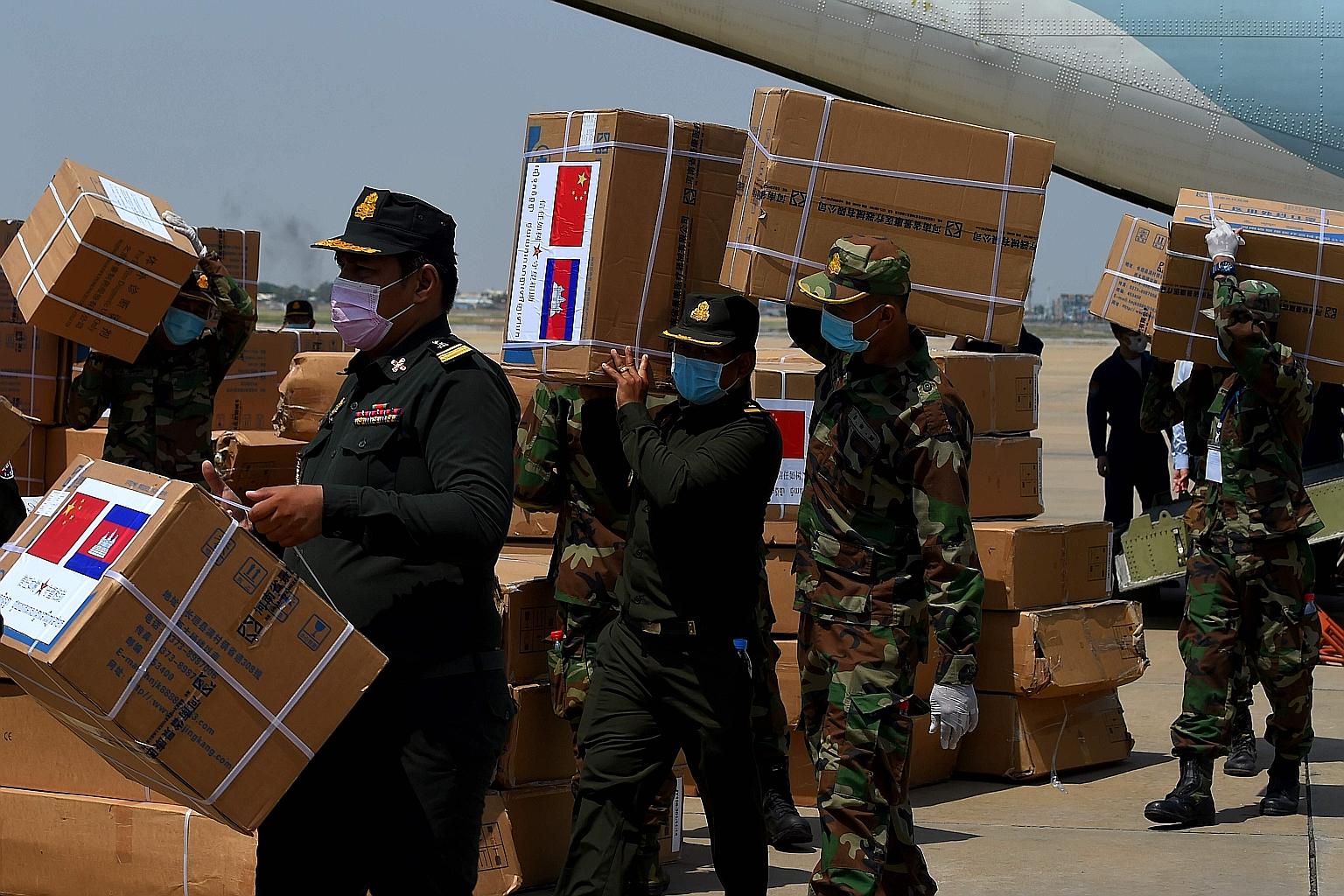China's anti-virus overtures strike different notes
Sign up now: Get insights on Asia's fast-moving developments

Cambodian soldiers carrying aid from China, including medical equipment to combat the spread of Covid-19 in the South-east Asian nation, last month. Beijing has sent planeloads of medical equipment abroad, pledged $2.8 billion in international aid to combat the pandemic and offered to make its potential vaccine available to all.
PHOTO: AGENCE FRANCE-PRESSE
Follow topic:
BEIJING • China has played two roles in the global battle against the coronavirus: a benevolent donor of aid, filling the void left by the United States, and combative superpower ready to bite back at critics.
Gone are the days of low-profile diplomacy promoted by late leader Deng Xiaoping, who said of Beijing that it should "hide your strength, bide your time".
Attitudes have changed under President Xi Jinping, who has pushed an increasingly confident policy abroad since taking office in 2012.
China has become even more assertive this year in the face of attacks over its handling of the Covid-19 outbreak, which was first detected on its shores late last year.
Beijing has sent planeloads of medical equipment abroad, pledged US$2 billion (S$2.8 billion) in international aid to combat the pandemic and offered to make its potential vaccine available to all.
The strategy is in line with China's use of its economic might to win friends on the world stage, with Mr Xi's signature global infrastructure programme - the Belt and Road Initiative - also expanding its influence abroad.
"Chinese aid, like other countries, is part of its soft power and also has commercial and political aims," Professor Jocelyn Chey, a former Australian diplomat and visiting professor at the University of Sydney, told Agence France-Presse.
Mixed with its generosity is a newfound readiness to tussle with geopolitical adversaries including the US, Australia and France.
State Councillor and Foreign Minister Wang Yi summed up China's attitude in a press conference on Sunday. "We never pick a fight or bully others, but at the same time, we have principles and guts," he said. "We will surely fight back against any malicious slander to defend national honour and dignity."
Since last year, Beijing has unleashed a pack of "wolf warrior" diplomats who use Twitter to vociferously defend and promote the country - while ignoring the irony that the platform is banned in mainland China.
The monicker comes from the title of a blockbuster Chinese film about a Rambo-like special forces soldier who takes on foreign mercenaries.
A prominent member of the "wolf" pack, Foreign Ministry spokesman Zhao Lijian, has raised eyebrows by promoting conspiracy theories that the US army may have brought the virus to China.
US President Donald Trump has also provided easy fodder for nationalist sentiment in China by calling the pandemic the "Chinese virus" and pushing ideas that it originated in a lab in the city of Wuhan.
"After Mr Trump came to power, China has been unable to evade the repressive policies he has adopted against China and can no longer keep its low profile," Beijing-based independent political commentator Hua Po said.
In Australia, the Chinese ambassador threatened a consumer boycott of the country's products after Canberra called for an independent investigation into the origins and spread of Covid-19.
China's ambassador to Paris was summoned by the French foreign ministry last month over a message on the embassy's website that criticised the Western response to the pandemic.
Professor Steve Tsang, director of the China Institute at the School of Oriental and African Studies in London, said Beijing's foreign policy is driven first by the interests of the ruling Communist Party and its priority to stay in power, especially with the Covid-19 crisis testing faith in the authorities.
"The aggressive propaganda and the 'wolf-warrior diplomacy' have turned many in the West against China, but this is just a price to be paid for a much more important objective of China's policy," he said.
While it might prove popular at home, winning friends on the international stage could be harder.
Political science professor Zhiqun Zhu at Bucknell University in Pennsylvania said China "faces an uphill battle to improve its international image".
"I don't think China has won the PR battle since China's soft power is weak and its narrative is largely shrugged off as official propaganda," he added.
AGENCE FRANCE-PRESSE

